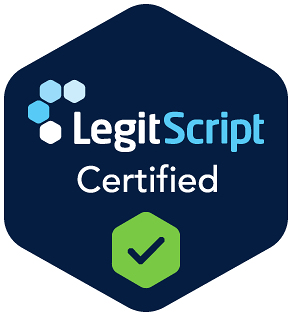.png)
What is Naltrexone and how does it work?
Naltrexone is an FDA-approved medication used to treat both alcohol use disorder (AUD) and opioid use disorder (OUD). It's not an opioid and is not addictive. Naltrexone works by blocking the opioid receptors in the brain. For AUD, this helps to reduce cravings for alcohol and diminish the pleasurable effects of drinking, making it easier to cut back or stop. For OUD, it blocks the euphoric effects of opioids and can reduce cravings, helping to prevent relapse.
Is Naltrexone right for me?
Naltrexone is a prescription medication, and its suitability depends on your individual health history and specific needs. Our licensed healthcare providers will conduct a thorough online assessment, including your medical history and current substance use, to determine if Naltrexone is a safe and appropriate treatment option for you.
Is this confidential?
Yes. All services are HIPAA-compliant and fully confidential. Medications ship in discreet packaging.
Do you accept insurance?
No, but our prices are structured to be affordable and all-inclusive. You may submit a receipt to your provider independently.
Can I cancel at anytime?
Yes. You’re never locked into a contract. Cancel, pause, or modify your plan easily from your account dashboard.
How is Naltrexone prescribed through telehealth?
Our telehealth service allows you to connect with a licensed healthcare provider from the comfort of your home. You'll complete an online assessment and then have a virtual consultation. If Naltrexone is deemed appropriate, your prescription will be sent electronically to our partner pharmacy, which will then discreetly ship the medication directly to your home.
Do I need to be in withdrawal before starting Naltrexone?
Yes, if you are being treated for Opioid Use Disorder, it is crucial that you are completely free of opioids for a specific period (typically 7-10 days, or longer for certain opioids like buprenorphine or methadone) before starting Naltrexone. Taking Naltrexone while opioids are in your system can cause severe and immediate opioid withdrawal symptoms. Your provider will guide you through this process and may recommend a urine drug screen to confirm opioid abstinence. For Alcohol Use Disorder, you can start Naltrexone while still drinking, but some individuals may experience fewer side effects if they are abstinent from alcohol when they begin treatment.
What are the common side effects of Naltrexone?
Common side effects can include nausea, vomiting, stomach pain/cramping, diarrhea, constipation, headache, dizziness, anxiety, nervousness, irritability, and difficulty sleeping. These side effects are usually mild and often decrease over time. It's important to discuss any side effects with your healthcare provider.
Are there any serious side effects or warnings?
Yes, while generally safe, Naltrexone can have serious side effects, though rare. These include:Liver damage: Naltrexone has a risk of liver injury, especially at excessive doses or in patients with pre-existing liver conditions. Your provider will assess your liver health.Opioid overdose risk: If you attempt to overcome the Naltrexone blockade by taking large amounts of opioids, it can lead to severe opioid intoxication, respiratory depression, coma, or death. After discontinuing Naltrexone, your tolerance to opioids may be reduced, increasing the risk of overdose if you relapse.Depression/suicidal thoughts: Individuals with substance use disorders can be at higher risk for depression and suicidal thoughts. If you experience new or worsening depression or suicidal thoughts, contact your provider immediately.Precipitated withdrawal: As mentioned, taking Naltrexone while opioids are in your system will cause severe withdrawal.Always inform your healthcare provider about all medications you are taking and any pre-existing medical conditions.







